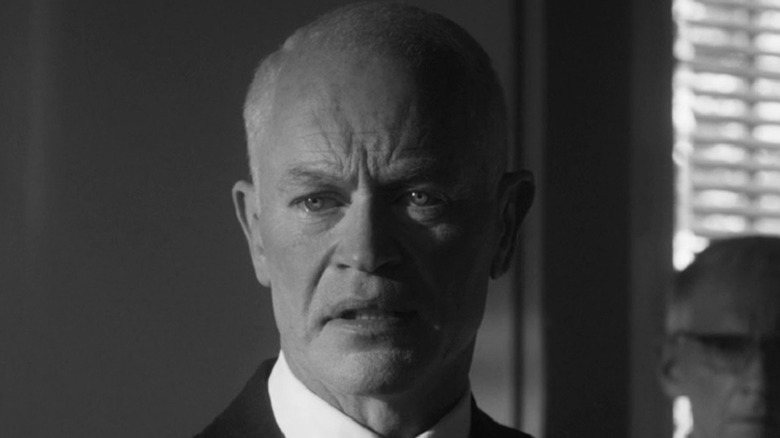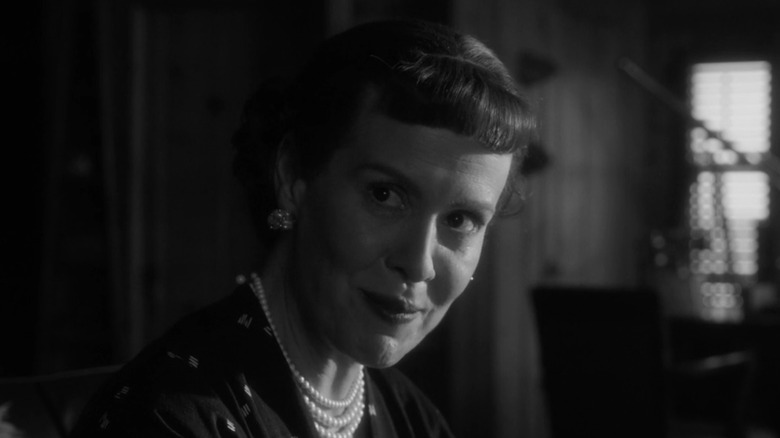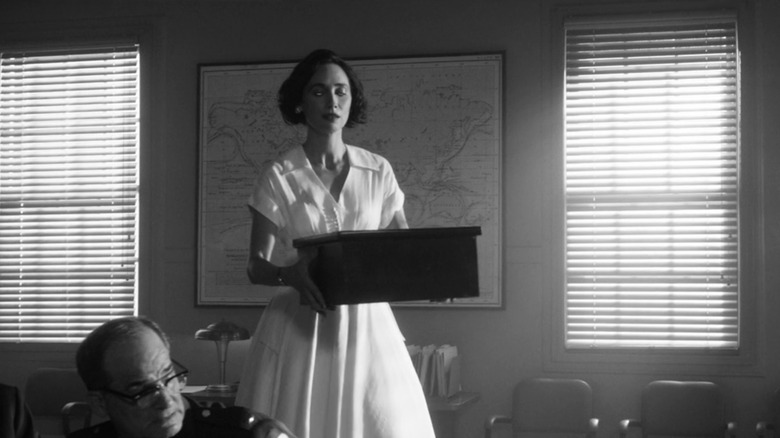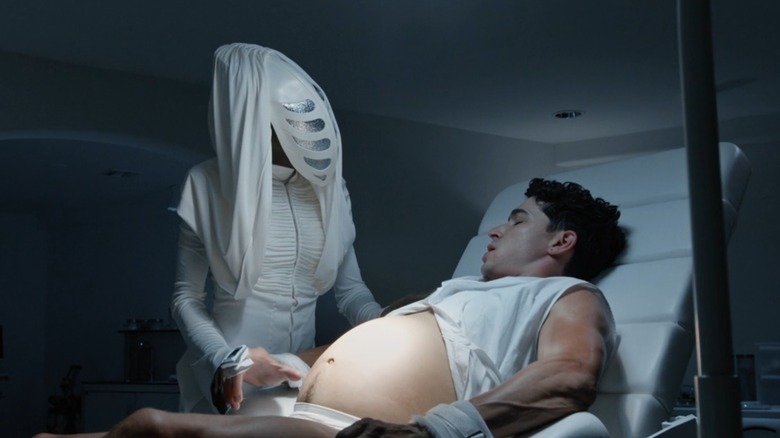The Ending Of American Horror Story: Death Valley Episode 2 Explained
Contains spoilers for Episode 2 of "American Horror Story: Death Valley"
The conspiracy deepened on this week's episode of the "Death Valley" portion of "American Horror Story: Double Feature." Not only did we learn more about what happened after aliens showed up on earth back in the 1950s, but we also got some insight into how their arrival has shaped history and how it's altering the present.
In the past, President Dwight "Ike" Eisenhower (Neal McDonough) grapples with what seems like an impossible decision handed down to him by the alien visitors. He can either choose to collaborate with them, which means giving them Americans to experiment on in exchange for access to advanced technology, or potentially suffer the consequences when the aliens take their offer to the Soviet Union. President Eisenhower has a hard time wrapping his head around such an intense decision. His wife Mamie (Sarah Paulson), on the other hand, believes that the answer is plain as day.
Flash forward to the present and we find our quartet of college friends grappling with their rapidly developing pregnancies. When they seek help, they are instead taken to an alien facility where they begin to understand the harsh reality of the situation they've found themselves wrapped up in.
Death Valley digs into some historical revisionism
The assassination of President John F. Kennedy (Mike Vogel) in 1963 has long been the subject of conspiracy theory and speculation. "Inside" posits its own version of events. The episode begins in the 1960s with former President Eisenhower and the future President Richard Nixon (Craig Sheffer) bringing Kennedy up to speed on the alien treaty of the 1950s. Kennedy is, of course, disturbed by these revelations. So much so that he seeks the counsel of his girlfriend, a Hollywood actor you may have heard of named Marilyn Monroe (Alisha Soper).
In real life, there was heavy speculation that Kennedy and Monroe had an affair during Kennedy's time in office. Furthermore, that alleged affair also helped fuel speculation that Monroe's 1962 death by barbiturate overdose may have actually been an assassination. This all ties into the timeline of American history presented here in "Death Valley." After Kennedy learns about the alien plot, Monroe encourages him to reveal what he knows. "The American people expect the truth from you," she tells him. "It's why they love you."
Later in the episode, news of Kennedy's assassination plays on the TV while the Eisenhowers enjoy a TV dinner made with their brand new microwave. It's heavily implied that he was killed to prevent him from doing what Monroe encouraged him to (and although the show doesn't get into it, we can assume that Monroe met a similar fate). While Ike is horrified at what is being done to protect the alien secret, Mamie believes it's all for the good of the country, saying, "This is patriotism at its finest."
Mamie Eisenhower gets in the game
Although she had a minor role in the premiere episode of "Death Valley," Mamie becomes more of a key figure in "Inside."
The focal point of the deal the aliens make with the US government — that the US will allow the aliens to abduct its citizens to be experimented on in exchange for advanced technology — is not just the technology itself, but what it represents. The US doesn't take the deal for the betterment of all of humanity, they do it to gain the upper hand in the Cold War. That kind of self-serving individualism is painted all over the show's portrayal of Mamie Eisenhower, who is shown as a major proponent of the deal.
There's a very interesting scene midway through the episode. In the midst of the plotting and conspiracy, we see Mamie planning her birthday party. She brags about popularizing a trend in adult birthday parties, a detail that feels connected to the alien storyline. Mamie's pride in being noticed for her birthday parties is in line with her staunch support of the deal to advance American interests. Both are driven by extreme individualism and, while not everybody who celebrates a birthday party views themselves this way, there are also notes of exceptionalism at play. Just as Mamie sees herself as exceptional for being a trendsetter, the US officials pushing the deal see their country as exceptional enough that it should have access to the alien technology.
Well, not all of the US officials feel that way. Just like how Kenny (Kaia Gerber) railed against technology in the premiere episode, we see that some in the government don't view what the aliens are offering as a net positive.
Should the alien technology be trusted?
In the 1950s, there's a heated meeting between Eisenhower and his advisors about whether or not to accept the treaty with the aliens. After the alien-possessed housewife glides into the room and shows off some of the tech the aliens want to gift the Americans, one official stands up to object. He says of the allure of this technology, "It's evil. Can't you see we're being tempted? This is our forty days in the desert."
While he uses religious allegory to make his case, it's not dissimilar to what Kenny was saying about the dangers of technological advancement last episode. She framed it through a psychological lens, but the point is the same: rapid technological advancement poses a danger to humanity.
There's another interesting component at play. The aliens reveal that the reason they need to cut a deal with the Americans at all is that, "Our world is dying, and if we can't find a way to live on yours, we will go extinct."
The aliens don't get into the specifics of why their world is dying but it's clear that their advanced technology didn't help them avert that catastrophe. The two pieces of tech the floating housewife shows Eisenhower's advisors are stealth technology for fighter jets and fiber optics, which will result in, as the alien explains, "The speed of every electronic device you have will be tripled."
It's notable that one of those pieces of technology is explicitly used for war and the other is to speed up technological advancements themselves, the very thing Kenny was decrying in the last episode. Is this alien tech actually a boon to the US? Or is it something that will eventually doom humanity to the same fate that the aliens are currently suffering?
Hey, is that Steve Jobs?
Meanwhile, in the present day, Kenny, Cal (Nico Greetham), Troy (Isaac Powell), and Jamie (Rachel Hilson) are taken to an alien facility where things start to get really freaky. Steve Jobs (Len Cordova) is there, which implies that in this version of the world, the Apple co-founder had some outside help with the technological advancements he's credited with. The group also meets a woman named Calico (Leslie Grossman), who has been experimented on by the aliens for decades. She is relatively chipper about the whole thing but our protagonists can't seem to match her enthusiasm. Troy, in particular, keeps raising a very important question as far as he and Cal are concerned: how are their hybrid alien babies going to be born?
"Inside" doesn't answer that question but it does take us right up to the brink of doing so. Troy begins to go into labor and is taken to a room where one of the alien attendants named Theta (Angelica Ross) tries to assure him that whatever happens will be for the betterment of the species.
Earlier, we learned that the crux of the alien's plan is that they need to develop a way to create a human-alien hybrid, as the aliens themselves aren't able to live on earth due to their incompatible immune systems. "Inside" ends with Theta removing her mask and revealing a bulbous face that is half-human, half-alien, implying that they've made some great strides in merging the two species since the 1950s.
The episode ends with Troy on the brink of labor and it looks like we'll have to wait until next week to see the exact human toll of Eisenhower's treaty with the aliens. Something tells us, though, that it's not going to be pretty.




